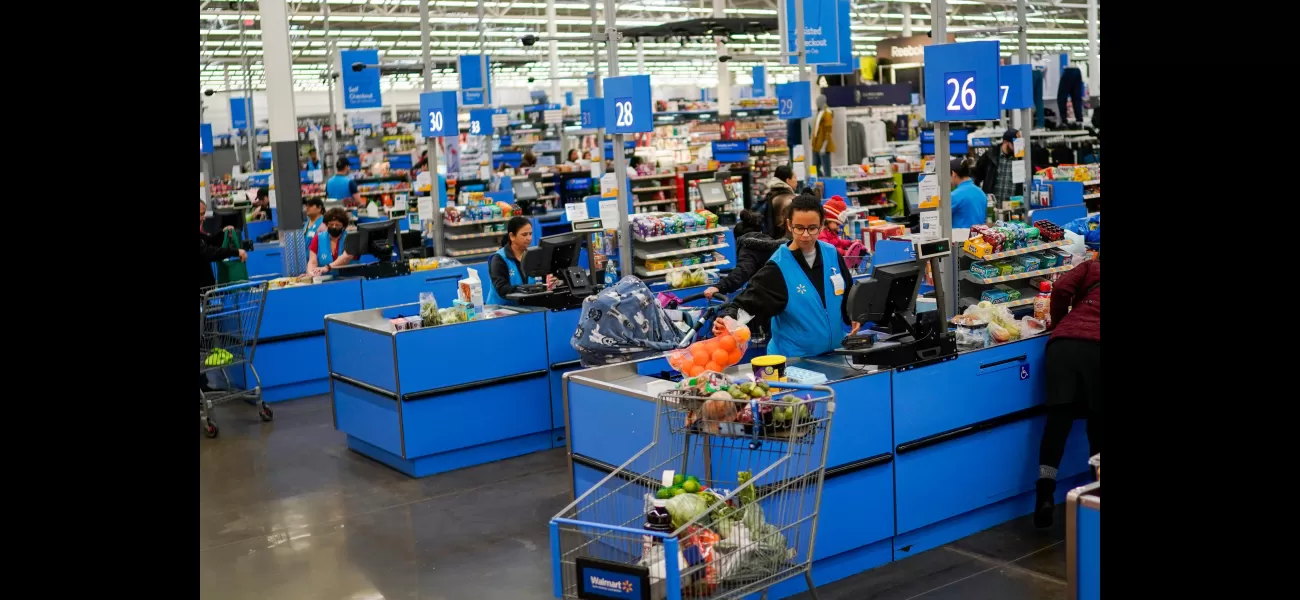To attract shoppers concerned about inflation, big retailers are promoting summer sales.
US citizens can enjoy Memorial Day by shopping for deals both online and in stores, adding to the excitement of the season.
May 27th 2024.

As the warm weather returns, Americans are eager to spend their Memorial Day weekend browsing for deals online and in stores. And this year, they may have even more to celebrate as major retailers are ramping up their discounts in hopes of enticing shoppers who have been hit hard by rising inflation.
Target, Walmart, and other chains have announced price cuts on thousands of items, both temporary and permanent, in an effort to provide some relief to their customers. These reductions mostly focus on groceries and come at a time when inflation is showing signs of slowing down, but not enough to ease the burden for consumers struggling to pay for essentials like rent and car insurance.
Despite the fact that many retailers, such as Walmart, Macy's, and Ralph Lauren, have reported steady sales, there is a growing trend among shoppers to be more selective and price-conscious. This has resulted in people delaying purchases, opting for store brands instead of pricier national brands, and seeking out deals.
According to Neil Saunders, managing director of consulting and data analysis firm GlobalData, retailers are aware of this trend and are making a concerted effort to keep their customers by offering competitive pricing. He notes that this is a major shift in strategy, as most companies have been focused on raising prices in the past few years. This marks the first major "price war" since before inflation began to rise.
So where can shoppers find these lower prices? Walmart, in particular, has seen success in attracting higher-income customers by offering discounts on essential items. In fact, the nation's largest retailer recently expanded its temporary price cuts to include nearly 7,000 grocery items, a 45% increase. This includes popular items like Bush's baked beans and Diet Coke, which are now marked down to make it easier for families to eat at home.
Not to be outdone, Target has also announced price cuts on 1,500 items, with plans to lower prices on an additional 3,500 products throughout the summer. These discounts primarily focus on food, beverages, and household essentials, such as Clorox wipes and Huggies baby wipes.
Even low-cost supermarket chain Aldi has joined in on the price-cutting trend, reducing prices on 250 products, including popular items for summer gatherings like barbeque supplies.
Meanwhile, fast-food giant McDonald's is also feeling the pressure to offer more affordable options to their customers. In response to slowing sales and frustration with high prices, the chain plans to introduce a $5 meal deal next month.
Even smaller retailers, like convenience store operator Arko Corp., are getting in on the action. They are offering aggressive deals for their loyalty program members, including free pizzas with the purchase of two 12-packs of Pepsi beverages.
Arie Kotler, chairman, president, and CEO of Arko Corp., says that they are focusing on essential items that families need to feed themselves. This comes after seeing a decline in customer visits and purchases due to the cumulative effects of rising gas prices and inflation.
In addition to many discounts on food items, other retailers, such as craft chain Michaels, are also reducing prices on frequently purchased items like paint and markers. These price cuts are intended to be permanent, and according to Michaels, some items are now even cheaper than they were in 2019.
But do these price cuts mean that prices are back to pre-pandemic levels? Many retailers say their goal is simply to offer some relief to their customers. Michaels, for example, says that their intention is to provide value to their customers and foster loyalty, rather than simply trying to make a profit.
Target points out that it's difficult to compare prices to a specific time frame, as the levels of inflation vary for each item and the discounts themselves vary by product.
According to the Bureau of Labor Statistics, the average price of a two-liter bottle of soda has increased significantly over the past five years, from $1.53 in April 2016 to $2.27 in April 2021. Similarly, the price of white bread and ground chuck have also risen.
With consumer confidence decreasing for the third consecutive month, retailers are feeling the pressure to offer more competitive prices in order to attract customers. This is especially true for online shopping, where the market share for the cheapest items has increased across various categories.
But how are retailers funding these price cuts? According to Saunders, it's likely a combination of reducing profits, negotiating with suppliers, and cutting expenses. He believes that raising prices on other items in order to compensate for the lowered prices would only lead to backlash from customers.
Target declined to disclose any details but did mention that their summer price promotions were included in their projected profit range, which falls below analysts' expectations. And GPM Investments, LLC, a subsidiary of ARKO Corp., says that their suppliers are the ones funding their convenience store promotions.
In the end, it's clear that retailers are taking notice of their customers' concerns about rising prices and are making efforts to provide some relief. Whether it's through temporary discounts or permanent price cuts, these retailers are hoping to keep their customers coming back and their businesses thriving.
Target, Walmart, and other chains have announced price cuts on thousands of items, both temporary and permanent, in an effort to provide some relief to their customers. These reductions mostly focus on groceries and come at a time when inflation is showing signs of slowing down, but not enough to ease the burden for consumers struggling to pay for essentials like rent and car insurance.
Despite the fact that many retailers, such as Walmart, Macy's, and Ralph Lauren, have reported steady sales, there is a growing trend among shoppers to be more selective and price-conscious. This has resulted in people delaying purchases, opting for store brands instead of pricier national brands, and seeking out deals.
According to Neil Saunders, managing director of consulting and data analysis firm GlobalData, retailers are aware of this trend and are making a concerted effort to keep their customers by offering competitive pricing. He notes that this is a major shift in strategy, as most companies have been focused on raising prices in the past few years. This marks the first major "price war" since before inflation began to rise.
So where can shoppers find these lower prices? Walmart, in particular, has seen success in attracting higher-income customers by offering discounts on essential items. In fact, the nation's largest retailer recently expanded its temporary price cuts to include nearly 7,000 grocery items, a 45% increase. This includes popular items like Bush's baked beans and Diet Coke, which are now marked down to make it easier for families to eat at home.
Not to be outdone, Target has also announced price cuts on 1,500 items, with plans to lower prices on an additional 3,500 products throughout the summer. These discounts primarily focus on food, beverages, and household essentials, such as Clorox wipes and Huggies baby wipes.
Even low-cost supermarket chain Aldi has joined in on the price-cutting trend, reducing prices on 250 products, including popular items for summer gatherings like barbeque supplies.
Meanwhile, fast-food giant McDonald's is also feeling the pressure to offer more affordable options to their customers. In response to slowing sales and frustration with high prices, the chain plans to introduce a $5 meal deal next month.
Even smaller retailers, like convenience store operator Arko Corp., are getting in on the action. They are offering aggressive deals for their loyalty program members, including free pizzas with the purchase of two 12-packs of Pepsi beverages.
Arie Kotler, chairman, president, and CEO of Arko Corp., says that they are focusing on essential items that families need to feed themselves. This comes after seeing a decline in customer visits and purchases due to the cumulative effects of rising gas prices and inflation.
In addition to many discounts on food items, other retailers, such as craft chain Michaels, are also reducing prices on frequently purchased items like paint and markers. These price cuts are intended to be permanent, and according to Michaels, some items are now even cheaper than they were in 2019.
But do these price cuts mean that prices are back to pre-pandemic levels? Many retailers say their goal is simply to offer some relief to their customers. Michaels, for example, says that their intention is to provide value to their customers and foster loyalty, rather than simply trying to make a profit.
Target points out that it's difficult to compare prices to a specific time frame, as the levels of inflation vary for each item and the discounts themselves vary by product.
According to the Bureau of Labor Statistics, the average price of a two-liter bottle of soda has increased significantly over the past five years, from $1.53 in April 2016 to $2.27 in April 2021. Similarly, the price of white bread and ground chuck have also risen.
With consumer confidence decreasing for the third consecutive month, retailers are feeling the pressure to offer more competitive prices in order to attract customers. This is especially true for online shopping, where the market share for the cheapest items has increased across various categories.
But how are retailers funding these price cuts? According to Saunders, it's likely a combination of reducing profits, negotiating with suppliers, and cutting expenses. He believes that raising prices on other items in order to compensate for the lowered prices would only lead to backlash from customers.
Target declined to disclose any details but did mention that their summer price promotions were included in their projected profit range, which falls below analysts' expectations. And GPM Investments, LLC, a subsidiary of ARKO Corp., says that their suppliers are the ones funding their convenience store promotions.
In the end, it's clear that retailers are taking notice of their customers' concerns about rising prices and are making efforts to provide some relief. Whether it's through temporary discounts or permanent price cuts, these retailers are hoping to keep their customers coming back and their businesses thriving.
[This article has been trending online recently and has been generated with AI. Your feed is customized.]
[Generative AI is experimental.]
0
0
Submit Comment





